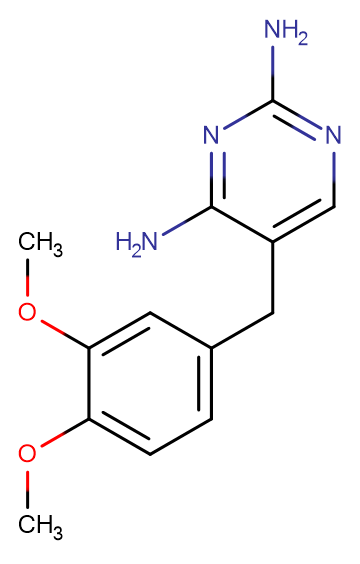
Diaveridine
CAS No. 5355-16-8
Diaveridine( AI3-23935 | AI323935 | AI3 23935 | CCRIS 3784 | CCRIS3784 | CCRIS-3784 | Diaveridin )
Catalog No. M14900 CAS No. 5355-16-8
Diaveridine (DVD) is a popular antibacterial synergist that is widely used in combination with sulfonamide.
Purity : >98% (HPLC)
 COA
COA
 Datasheet
Datasheet
 HNMR
HNMR
 HPLC
HPLC
 MSDS
MSDS
 Handing Instructions
Handing Instructions
| Size | Price / USD | Stock | Quantity |
| 100MG | 30 | In Stock |


|
| 200MG | 41 | In Stock |


|
| 500MG | Get Quote | In Stock |


|
| 1G | Get Quote | In Stock |


|
Biological Information
-
Product NameDiaveridine
-
NoteResearch use only, not for human use.
-
Brief DescriptionDiaveridine (DVD) is a popular antibacterial synergist that is widely used in combination with sulfonamide.
-
DescriptionDiaveridine (DVD) is a popular antibacterial synergist that is widely used in combination with sulfonamide. It has been reported to be genotoxic to mammalian cells, but more studies are required to clarify this.(In Vitro):Diaveridine is a dihydrofolate reductase (DHFR) inhibitor with a Ki of 11.5 nM for the wild type DHFR and also an antibacterial agent. Treatments with Diaveridine for 90 min have a strong bactericidal effect on S. typhimurium TA1535, and no bacterial growth is observed at 10μg/mL or more. Without metabolic activation, treatment with Diaveridine for 48 h, but not 24 h, causes a dose-dependent, significant increase in the frequency of aberrant metaphases. At 100 μg/mL, 60% of the metaphases contain chromosome aberrations. (In Vivo):The sperm abnormality of the Diaveridine (DVD) treatment groups at all dose levels (Diaveridine, 128 to 512 mg/kg) shows no significant differences compare with the negative control group. There are no significant differences of micronucleus between the negative control group and the Diaveridine treatment groups (Diaveridine, 128 to 512 mg/kg). The chromosome aberration of the Diaveridine treatment groups at all dose levels and the negative control group are significantly lower than those in the positive control group treated with cyclophosphamide (P<0.05), indicating that Diaveridine at the doses studied does not cause abnormal chromosome aberration. The results demonstrate that the Diaveridine administration does not produce significant changes in the ratio of organ-to-body weight, compare with the negative control group in the end period of the study.
-
In VitroDiaveridine is a dihydrofolate reductase (DHFR) inhibitor with a Ki of 11.5 nM for the wild type DHFR and also an antibacterial agent. Treatments with Diaveridine for 90 min have a strong bactericidal effect on S. typhimurium TA1535, and no bacterial growth is observed at 10μg/mL or more. Without metabolic activation, treatment with Diaveridine for 48 h, but not 24 h, causes a dose-dependent, significant increase in the frequency of aberrant metaphases. At 100 μg/mL, 60% of the metaphases contain chromosome aberrations.
-
In VivoThe sperm abnormality of the Diaveridine (DVD) treatment groups at all dose levels (Diaveridine, 128 to 512 mg/kg) shows no significant differences compare with the negative control group. There are no significant differences of micronucleus between the negative control group and the Diaveridine treatment groups (Diaveridine, 128 to 512 mg/kg). The chromosome aberration of the Diaveridine treatment groups at all dose levels and the negative control group are significantly lower than those in the positive control group treated with cyclophosphamide (P<0.05), indicating that Diaveridine at the doses studied does not cause abnormal chromosome aberration. The results demonstrate that the Diaveridine administration does not produce significant changes in the ratio of organ-to-body weight, compare with the negative control group in the end period of the study.
-
SynonymsAI3-23935 | AI323935 | AI3 23935 | CCRIS 3784 | CCRIS3784 | CCRIS-3784 | Diaveridin
-
PathwayOthers
-
TargetOther Targets
-
RecptorOthers
-
Research Area——
-
Indication——
Chemical Information
-
CAS Number5355-16-8
-
Formula Weight260.29
-
Molecular FormulaC13H16N4O2
-
Purity>98% (HPLC)
-
SolubilityDMSO: > 10 mM
-
SMILESNC1=NC=C(CC2=CC=C(OC)C(OC)=C2)C(N)=N1
-
Chemical Name5-(3,4-dimethoxybenzyl)pyrimidine-2,4-diamine
Shipping & Storage Information
-
Storage(-20℃)
-
ShippingWith Ice Pack
-
Stability≥ 2 years
Reference
1.Ono T, et al. Environ Toxicol Pharmacol. 1997 Sep;3(4):297-306.
molnova catalog



related products
-
3-Bromopyruvic acid
3-Bromopyruvic acid is a hexokinase II inhibitor with Ki of 2.4 mM for glycolysis/hexokinase inhibition. It is inhibitor of tumour cell energy metabolism and chemopotentiator of platinum drugs.
-
GRGDSPK
GRGDSPK is an inhibitory peptide for RGD-mediated adhesion between integrin and extracellular matrix molecules.
-
TAT-amide
TAT-amide is a cell penetrating peptide. Cell-penetrating peptides (CPPs) are short amino acid sequences able to enter different cells.



 Cart
Cart
 sales@molnova.com
sales@molnova.com


